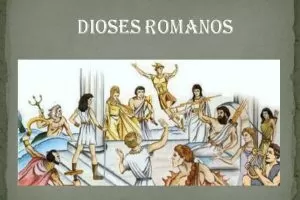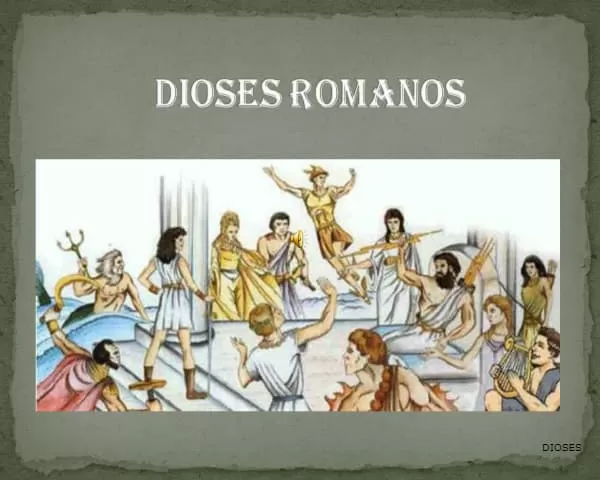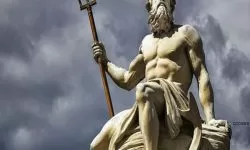These gods were worshipped in the great temple on Capitoline Hill and, as such, were known as the Capitoline Triad. The triad consisted of Jupiter (Zeus), Juno (Hera) and Minerva (Athena). The Romans adopted much of the Greek mythology into their own. They took most of the Greek gods, gave them Roman names, and then called them their own.
Click on any of the Images and Discover the History of the Roman Deities
Roman Gods and Their Meaning
APOLLO
Meaning of Apollo
The God of the sun, poetry, music and oracles and the God of prophecy. Apollo is a god of prophecy, which means he knows things. He is the boy who whispers in the ear of every oracle. He is complex, he is associated with healing, but he is credited with sickness, known for destruction, redemption and purification.
Mythologically, he is probably most famous for spending his younger years in exile on earth, working as a shepherd for a local king. He liked the king so much that he helped him get married and gave him immortality as a wedding gift. Well, immortality with a trick – other people had to voluntarily give him their life, and it ended up being his wife who died to save him. Irony, right? But Proserpina was so moved by the sacrifice that she gave him back his life, so everything was fine in the end.
BACO
Meaning of Bacchus
God of parties and wine. Think of Bacchus as the Roman god of festivals. His annual festival, Bacchalia, would get so out of hand that the Roman Senate passed laws to contain it, on pain of death. A couple of sources I found in him claim that it was all exaggerated and that the anti-Bacchanalia laws could have been less about Roman praise and more about religious control in uncertain times.
CERES
Meaning of Ceres
The goddess of agriculture. Ceres is another old goddess, with the Roman cult dating back to at least 700 BC, and at least one book I found related her to the word “grain”.
CUPIDO
Meaning of Cupid
The god of love. While some myths describe Cupid as the son of Mars and Venus, and that is how I have depicted him here, others describe him as an ancient primordial god who precedes almost all other gods. He himself does not appear in too many myths, and usually only appears in the Roman art that accompanies Venus.
DIANA
Meaning of Diana
The goddess of the hunt. Diana’s first experience in life was helping her mother give birth to her twin brother, Apollo. It took a week, and in the end Diana had sworn never, ever, ever to get pregnant. Now she roams the woods with an entourage of nymphs who must also be virgins.
FAUNO
Meaning of Fauna
Cuckold god of the forest. Faun may be the oldest god on this list, with some theories placing his origins thousands of years before Rome. He was a god of the wild places – forests, plains and fields. However, unlike other Roman gods, he did not completely merge with his Greek counterpart, although he did end up with the horns of Pan.
JANUS
Meaning of Janus
The God of doors and beginnings and endings and the God of transitions. Janus is the only real god on this list with no Greek equivalent, and I think it’s totally fascinating. He’s a god of beginnings and ends and gates and doors. Each of his shrines in Rome overlooked a canal and contained at least one door that they would open every time Rome was at war.
They also closed them when Rome was at peace, though that didn’t happen very often. In some words, Janus has no parents, some are primordial deities, and some are Caelus and Trivia, a goddess who, despite her name, has nothing to do with strange events and everything to do with spooky things like crossroads and witchcraft.
JUNO
Meaning of Juno
Juno is the patron goddess of Rome, standing with her husband, Jupiter, and her daughter, Minerva, in the Capitoline Triad. As much as Juno is dedicated to women, marriage and childbirth, Juno combines that with a variety of other roles in war and government. There is also a story where Juno tries to prevent the founding of Rome because she heard a prophecy that she would destroy Carthage, a North African city state that she liked best. Rome was founded anyway and Carthage ended up totally destroyed several centuries later.
JUPITER
Meaning of Jupiter
The king of the gods and the god of heaven and rain. Jupiter was the main god of Rome, from its early days as a small kingdom, through its centuries as a republic and most of its time as an empire, until the traditional Roman religion was replaced by Christianity. The Romans believed that all their expansion and success was due to Jupiter having his back and they did their best to keep it that way. Jupiter obtained great temples, great sacrifices and constant praise: its most important title, Jupiter Optimus Maximus, is literally translated as “Jupiter, the Best and the Best”.
MARS
Meaning of Mars
The God of War. He’s a kind of dumb cue, big and sturdy and good at fighting, but not much between the ears, strong and smart, as useful in peace as in war, a kind of Superman. He is such a virile man that his symbol, the Spear of Mars, has become the symbol of the male gender. He was one of the most important Roman gods, surpassed only by Jupiter, and considered the father of the founders of Rome.
MERCURY
Meaning of Mercury
The Messenger of the Gods and of Commerce and Finance. Mercury is a god of travel, trade, diplomacy and theft, famous for his hat and winged shoes, and the most incorrigible prankster in the entire Roman pantheon. He hadn’t been alive for a whole day before he stole Apollo’s cattle. He even put little booties on them so they wouldn’t leave tracks.
Apollo tracked him down anyway (it’s hard to fool the god of prophecy) and ultimately traded the cows for a cool new instrument that Mercury had invented: the world’s first lyre, which is basically a small harp.
MINERVA
Meaning of Minerva
The goddess of wisdom, the city, education, science and war. Minerva tends to focus on her intelligence, skill and healing abilities. But she’s probably wondering about the whole “bursting out fully armed from the front” thing.
Jupiter had knocked up Metis, but he was worried that the child would knock him down, just as he had knocked down Saturn and Saturn had knocked down Caelus. So, he ate Metis. Some time later, Jupiter came down with a headache. He tried to ignore it at first, but then it got so bad that he ordered the blacksmith god Vulcan to break his head to break the pain. Vulcan did so, and Minerva exploded, fully armed and armored.
NEPTUNE
Meaning of Neptune
The god of the sea. By modern standards, Neptune is a big jerk. He’s a wild, untamed god with a bad temper and a bad habit of raping women. I mean, Jupiter raped women too, but at least his costumes and tricks make him a little more caricatured in the count. Neptune just attacked them. Neptune had no association with horses.
PLUTO
Meaning of Pluto
The god of the underworld. Pluto presides over the Roman underworld and the spirits of the dead that live there. While sharing myths with his Greek counterpart, Hades, Pluto is often depicted as less sinister.
The early Greeks depicted it as a kind of eternal and depressing folly where the dead would float around and not do much, but over time this changed and expanded to include punishment and rewards. They even got a kind of heaven, the Elysian Fields, although that was reserved for the more heroic heroes.
SATURN
Meaning of Saturn
God of harvest and agriculture. If you’ve been reading this in order, you may remember that Caelus’ boy cut off his penis. Saturn was that boy, and once Caelus was out of the picture, Saturn took over the new king of the gods, at least until his son, Jupiter, overthrew him.
The worship of Saturn seems to go a long way, it appears in some of the earliest Roman references. Its annual festival, the Saturnalia, was one of the rarest festivals in the Roman calendar. For an entire week around the winter solstice, business ceased, laws against gambling were suspended, everyone ate, drank and gave each other gifts as a joke, and at least one Roman source claims that the masters served their slaves.
VENUS
Meaning of Venus
Goddess of love and beauty. The name Venus, in Latin, means something like “sexual desire”, and that is more or less what it is about: love, sex, beauty and seduction. She is also an ancestor of Romulus and Remus, the mythical founders of Rome, but there are enough generations between her and them that I didn’t bother to relate them on the tablet.
The “sea foam” bit comes from my favorite of Venus’ birth stories. After Caelus’ penis was cut off, it landed in the ocean and produced a lot of “sea foam”, from which Venus emerged.
SEE
Meaning of Vesta
The goddess of the heart and the Roman state. Vesta was the virgin goddess of home, hearth and family, and was depicted as a fire more often than a human. Her priests were called vestal virgins and swore that they would remain celibate.
I am ashamed to admit that I once thought that vestal virgins had something to do with vests, but I don’t think I was entirely wrong. Vesta is also the name of one of the largest asteroids in the solar system. It’s a little smaller than Poland.
VULCAN
Meaning of Vulcan
The god of fire, the forge and the blacksmiths. Vulcan was born crippled and his own mother expelled him from Olympus, but he had his revenge. She made him a chair that was rigged to trap him when he sat in it, and then he refused to let go of it until Bacchus got him so drunk that he would have said yes to anything. At their annual festival, Vulcanalia, the Romans celebrated by throwing animals into bonfires.
What Were the Roman Gods Like ?
- It was believed that many gods were involved in the founding of Rome. They were all consulted and honored to ensure that the actions of the state obtained divine approval.
- The Roman religion was divided into two: in private, families and households worshipped specific and individual spirits. In public, the Roman state honored many gods, all of whom were believed to have human characteristics.
- Over the centuries, the movement of large numbers of people caused the gods of various cultures, including the Etruscans and the Greeks, to merge. As a result, the Roman gods were a mixture of deities, with close similarities to the gods worshipped by the ancient Greeks.
- In particular, the twelve greatest gods and goddesses of the Roman state religion, called di consentes, were parallel to the gods of Greek mythology.
- Although they maintained names and images in Latin, the links between the Roman and Greek gods gradually came together to form a divine family that ruled over other gods as well as mortals.
- The three most important gods were Jupiter (protector of the state), Juno (protector of women), and Minerva (goddess of art and wisdom). Other important gods were Mars (god of war), Mercury (god of commerce and messenger of the gods) and Bacchus (god of grapes and wine production).
- The Romans also believed that many of their gods had played an active role in founding Rome.
- It was believed that Venus was the mother of Aeneas, who according to legend had founded Rome, making her the divine mother of the Roman people. Similarly, Mars was the father of Romulus and Remus, the founders of Rome.
How Did the Roman Gods Live ?
Jupiter influenced every aspect of Roman life; his temple on Capitoline Hill was the final destination of many victorious military commanders.
At the beginning of the development of Roman mythology, there was Saturn, equivalent to the Greek god Cronus. His temple on Capitoline hill included the public treasury and the decrees of the Roman Senate.
The triads of the early Roman worship gods were recreated as Jupiter, Juno and Minerva; the latter was the patron saint of craftsmen and the goddess of school children.
Jupiter, the god of heaven, became more like the Greek Zeus. Jupiter influenced every aspect of a Roman’s life; his temple on Capitoline Hill was the final destination of many victorious military commanders who would leave a portion of their booty as an offering to Jupiter.
His wife (and sister) Juno remembered Hera, presiding over every facet of Roman women’s lives, and in the case of Aeneas, vindictive against those she did not like.
Similarly, the goddess of love Aphrodite became Venus, born of sea foam, while Zeus’ brothers, Hades and Poseidon, became Pluto and Neptune, respectively.
The Greek Artemis was renamed Diana, the goddess of hunting, while Ares, the god of war, was now Mars, which had originally been an agricultural god associated with spring, a time of regeneration.
Roman commanders would always make a sacrifice to him before a battle. And finally, we must not forget Hermes, the messenger, who became Mercury, a lesser deity who had once been the god of commerce and profit and, as mentioned, Hercules, the Roman version of Heracles.
As in Greece, Roman cities often adopted their own patron deity and built temples and performed rituals to honor that god.
And, while the influence of the Greeks is vast, the Romans had a number of original gods, such as Janus, the two-faced god of gates and doors (the city gates were open during war and closed during peacetime).
Similar to the Etruscan god Culsans, Janus could see both the future and the past. Valued for his wisdom, he presided over the beginnings of all events. There was also Vesta, daughter of Saturn and the goddess of the heart and family life, whose followers were called the Vestal Virgins.
Though linked to the goddess Hestia of the Greeks, she took on her own personality in the Roman mythology. Numa, the second king of Rome, founded a cult dedicated to Vesta. Finally, there was Faun, the god of nature; he was worshipped as the protector of crops with a festival in December.
Every May (9, 11 and 13) there was the festival of Lemuria, where the spirits of the dead were exorcised. Many Romans believed that the spirits of their ancestors were constantly watching over them.
While many people only think of the Greeks when considering the subject of mythology, the Romans had a rich and vibrant mythology of their own.
We have all heard, in some way, the story of the she-wolf and her salvation from the Romulus and Remus brothers and, in this same way, many other Roman myths have become part of our culture today.
For the Greeks and Romans, the myths explained who they were as a people and gave them a sense of national pride, an understanding of worth and honour, and a vision of their destiny.
How Did the Roman Mythological Gods Disappear ?
From the 350’s, the emperor Constantine II introduced the death penalty to practice pagan rituals.
Of course, it was not extinguished until much later, but interest would have declined significantly as Christianity became more and more popular, and eventually became the official state religion.
Contemporary Christians treated Constantine’s conversion as a decisive moment of victory in a cosmic battle between good and evil, even as the end of history, but it was far from that.
Christianity gradually increased in numbers over the next two centuries, and among Constantine’s successors only one, Emperor Julian in the 360s AD, mounted a concerted action to re-establish paganism as the dominant religion in the empire.
But there was no “triumph”, no time when the Christians would have “won” a visible battle against the pagans. Progress was small, hesitant, geographically uneven.
The progress of Christianity was small, hesitant, geographically irregular.
Christianity offered spiritual comfort and the prospect of salvation on the one hand, and attractive new career paths and even wealth as a worldly bishop on the other.
But many pagans, both aristocrats based in the great cities of the empire and rural people, remained steadfast in their adherence to an ancient faith.
One hundred years after Constantine’s “conversion”, Christianity seemed to be entrenched as the established religion, sponsored by the emperors and protected by law. But this didn’t mean that paganism had disappeared.
In fact, when the pagans blamed Christian impiety (meaning neglect of the ancient gods) for the barbaric sack of Rome in 410 AD, one of the leading Christian intellectuals of the time.
Studies of Other Mythological Gods in ALPHAPEDIA
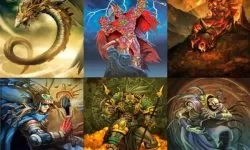
AZTEC GODS: List of Names, Meanings and Powers
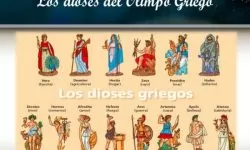
OLIMPUS GODS: ¿ Who Are ? ¿ What Are ? Names and Powers
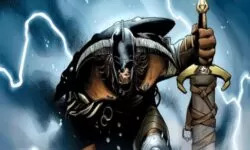
NORSE GODS: Names, Meaning, Powers and History
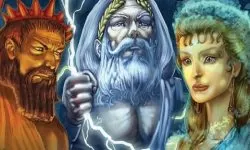
GREEK GODS: Names, Family Tree and Their Powers

THE GODDESSES OF MYTHOLOGY: Their Names and Meanings
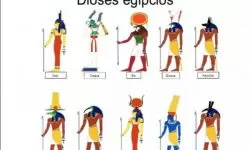
EGYPTIAN GODS: Their Names and Meanings
Astrology in ALPHAPEDIA
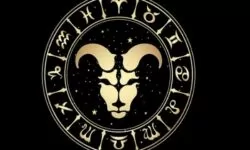
ARIES ZODIAC SIGN: Meaning, Characteristics and Personality
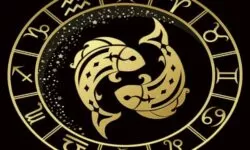
AQUARIUS: Meaning, Characteristics and Personality
Other Topics of Interest in ALPHAPEDIA

FREE MASTER DEGREE IN INNOVATION

HIGH SCHOOL DEGREE

FREE MASTER DEGREE IN PUBLIC MANAGEMENT

DEFINITION OF ATOM

FREE DOG PSYCHOLOGY COURSE

FREE MASTER DEGREE IN RADIOLOGY
IMAGES OF ROMAN GODS
